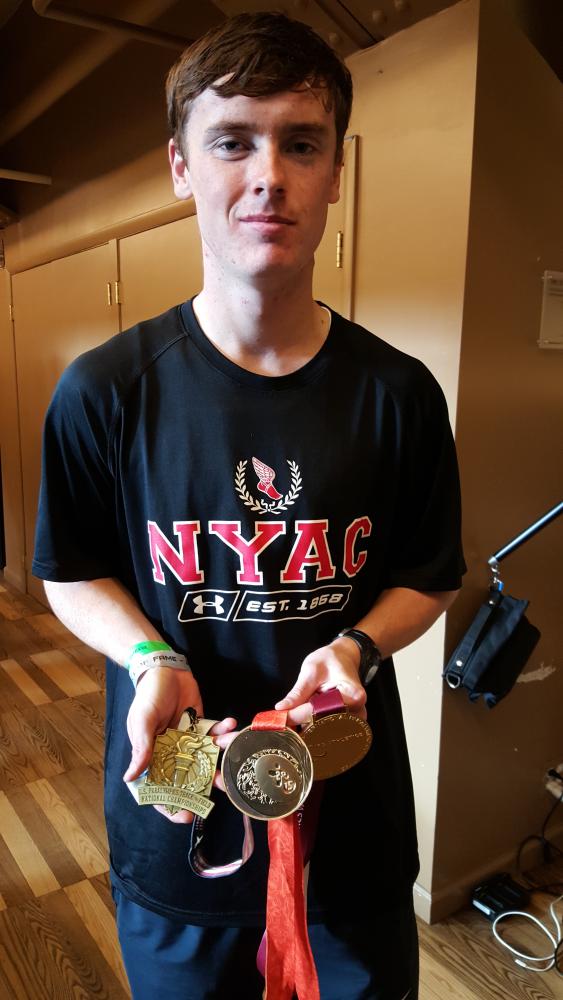Folders |
Coach Sonja Robinson Keeps Mikey Brannigan On TrackPublished by
Selfless coach maintains Mikey's development By Doug Binder, DyeStat Editor On an overcast June afternoon in suburban Portland, Sonja Robinson and Mikey Brannigan went through their usual routine on a borrowed track. Robinson patiently waited for her one and only athlete, a 20-year-old Paralympic gold medalist, to go through his warm-up drills. With few words, she prompted him through every stage of the workout. Over the course of a speed session, Robinson told Brannigan to slow down when he was going too fast, reminded him to relax, and praised him for his effort as he pushed through his most difficult intervals. In between two races in Portland and a speaking engagement for the Autism Society of Oregon (part of the Portland Track Speaker Series), Robinson cooked meals for Brannigan, prepped him for his Q&A session downtown, and spent most every waking minute with him. This is the life that they have chosen. Mikey, who would have been a sophomore in college this spring if that had been an option for him, aspires to be one of the greatest runners in the world. It is his day-to-day job to pursue that dream. He is in London, preparing to tackle his biggest challenge yet. He has been prepared to try and win three events in the T-20 category at the World Para Championships – the 800 meters, the 1,500 and the 5,000 – and the first race scheduled for Monday. Robinson, a former track athlete, club coach and USATF administrator, has taken it upon herself to be his coach, his teacher, his personal chef and his advocate. For more than two years, she has managed nearly every aspect of Mikey’s life, on the track and off. “Everything that Mikey is today as a runner is because of Sonja,” said Edie Brannigan, Mikey’s mother. “Look, Rolling Thunder (club) played a part, the road races that he did, coach (Jason) Strom and the high school team (Northport NY). But if it wasn’t for Sonja, Mikey would be at home, running local road races and working a little job around here, and that would be his life.” Mikey’s story is well known. Diagnosed with autism at age 3, his life has been severely affected by an intellectual disability. When he discovered a talent for running, fostered by coach Steve Cuomo and his Long Island club, Rolling Thunder, new worlds of opportunity opened up.
Mikey dreamed of going to college and running at a Division I school like his running peers. But there was simply no way that he could meet the NCAA clearinghouse requirements. And further, it would not have been safe for him to move to a new environment that lacked supervision. Robinson, at that time, was advising the Brannigan family. She knew that there were too many roadblocks to Mikey leaving home and going off to college. But she stayed on the sidelines and let his parents examine all of the options. “I knew enough to know that (the Brannigans) needed to go through that whole college question and answer it for themselves,” Robinson said. Robinson’s daughter is a learning specialist in Tennessee. She looked at Mikey’s case and concluded that there was no viable option for going to college. “She tried to work it six ways from Sunday,” Robinson said. “There was just no way. No way.” But as Mikey’s parents continued to learn that for themselves, Robinson was crafting a new plan behind the scenes. Robinson introduced the Brannigans to the idea that Mikey could become a Para athlete and train for the Paralympic Games. Mikey met the qualifications for category T-20, in which an athlete “must have major limitations in his or her adaptive behavior and must possess an IQ of 75 or lower.” It is a classification that covers not only autism but a variety of other diagnoses. Robinson called an old friend, New York Athletic Club athletic director Cedric Jones, and asked him whether the prestigious club would accept and sponsor Mikey as one of its elite athletes. Jones agreed. “I don’t think we ever really considered what else we would do if he didn’t get into (college) because I wouldn’t even know what the choices were,” Edie Brannigan said. “I didn’t know what Para was. I talk to people today who think it’s the Special Olympics. People don’t have a clue.” Robinson sat down with the family and laid out her plan. “Sonja just kind of appeared into our life, like, a little bit, a little bit more, more, more, more, and now she’s everything,” Edie said. Robinson didn’t know that she would become “everything.” She was the treasurer for the USATF Athletes’ Advisory Committee, living in Atlanta. She was also a distance running coach. Then one day at a USATF conference, board member and Hall of Famer Dr. Evie Dennis approached Robinson and asked her to come and sit in on a meeting about adaptive sport. “We need your mind in this meeting,” Robinson recalls Dr. Dennis telling her. Robinson listened. When the meeting was over, Cuomo, the head of the Rolling Thunder Special Needs Program, which serves mentally and physically disabled athletes, walked up to Robinson and said “Evie said you are going to help us.” Robinson was taken aback, but she continued to listen. Cuomo needed help with a proposal to get USATF to consider replicating his program in other parts of the country. “Any time someone is trying to expose kids to the sport, sign me up and tell me what you need,” Robinson said. Robinson began to lend her assistance to Cuomo, and help him navigate the bureaucracy of the USATF. Later, Cuomo invited Robinson to come to a Rolling Thunder cross country camp on Long Island. Over the months that followed, Cuomo sent Robinson random e-mails about an emerging star runner with autism: Mikey Brannigan. It wasn’t until later still that Robinson first met Mikey and his parents. She explained the Para program to them, told them that he needed to get classified in order to compete and perhaps qualify for the U.S. team. “I got them started on that process,” Robinson said. After Mikey graduated, and college was off the table, Robinson consulted with Northport coach Jason Strom about his training. Strom’s wife was due with a baby that summer and he couldn’t stay on as Mikey’s coach. Robinson expected that Joaquim Cruz, the Brazilian 1984 Olympic gold medalist and head running coach at the U.S. Olympic Training Center in Chula Vista, Calif. would become Mikey’s coach. But Cruz suggested that since Robinson knew Mikey best that she ought to become his coach. And so she just started doing it. “Going professional, joining the NYAC and getting on board with the USOC for the para stuff, it all happened in about two weeks after we knew (Mikey) wasn’t going to college,” Edie said. “It was beyond our wildest dreams. We had no plan, and then it was entirely laid out for us by Sonja.” Grateful as they were to have Robinson’s advice and forethought, Kevin and Edie Brannigan couldn’t help but wonder: Why? Why did this obviously talented woman show up and take such a strong interest in Mikey’s future? “It was never clear to me where she was coming from,” Edie said. “Poof, out of nowhere she was there.” And yet there she stayed. Within months, Robinson coached Mikey to a gold medal in the 1,500 meters and a silver medal in the 5,000 at the 2015 World Para Championships in Doha, Qatar. Robinson moved into the Brannigan home. She has spent more than a year on the family’s living room couch. Other than a $300 per month stipend from the U.S. Olympic Committee, she is not paid. “She literally dropped everything and jumped on this mission with Mikey,” Edie said. Eventually, the ‘Why’ question began to be slowly be revealed. “She’s in it for the love of running and excitement of competing, and for the love of the inspiration of Mikey,” Edie said. “At some level, she’s a fan. She’s inspired for him. It’s a God-given situation.” Robinson chooses her words carefully when asked “Why?” “It’s challenging. It’s fulfilling,” she said. “It’s rewarding and all of that. I’m trying to put together all the pieces.” One of Robinson’s daily tasks is managing Mikey’s diet. He grew up eating healthy food. He’s been gluten free for years. But his portions, sometimes gauged by his impulses, were out of control. Before Robinson started working with him full-time, Mikey ate his way up to 175 pounds. If he told his mom he was hungry, she might fix him eight eggs. Robinson explained that it should be two, or three. “If he got hungry he might eat two whole chickens,” she said. Robinson studied nutrition and began policing all of Mikey’s meals. “She can be in another room on the phone and she can hear the crinkling of a wrapper,” Edie said. Robinson spends hours on the computer figuring everything out. She consults with Cruz occasionally for workouts. And recently, Mikey has been invited to jump in with Frank Gagliano’s HOKA New Jersey-New York Track Club group. Gagliano has offered training advice as well. Last year, two months prior to the Paralympic Games, Robinson arrived at the race strategy that would eventually net a gold medal in the 1,500 meters. “I knew that I could not let it come down to the final 400,” Robinson said. “Peyman (Nasiri Bazanjani) from Iran, he was a sprinter. He was a 48-second quarter miler. I don’t care if he’s 33 years old, you can’t sleep on someone like that.” In 2015, Mikey had barely beaten the Iranian runner. “I knew (the move) had to be 700 meters,” Robinson said. “In June (of 2016) I remember saying it in Chula Vista to Mikey. We are going to chill for the first 800. Then we’re going to show the athlete that you are and it’s going to start getting hot. We’re going to separate the boys from the men. And Mikey, you’re the man in this race.” The final played out in similar fashion to Matthew Centrowitz’s Olympic gold medal race. Mikey dictated the early tempo for two laps and then gradually accelerated and pulled away from all of his challengers, including the hard-driving Nasiri Bazanjani. “Each 100 (meters), Mikey did it perfectly,” Robinson said proudly. Mikey went to Rio de Janiero as the favorite in the race based in large part upon the historic sub-four mile that he ran on Aug. 5 at the Sir Walter Miler in North Carolina (3:57.58). It was an achievement that echoed across the globe. Robinson said in the hours after Mikey’s race that BBC reporter Ade Adedoyin began texting her. He was in Rio that night covering the Opening Ceremonies of the Olympic Games. “My phone keeps buzzing and (Adedoyin) is texting me from Brazil. ‘Hey, Mikey just broke four minutes in the mile?’ He was so excited,” Robinson recalled. A year later, Robinson has continued to remove the excesses from Mikey’s diet and continued to work on his strength and speed. His body is lean and strong as ever. And since April, he has grown an extra half inch taller. Robinson continues to learn what it means to be a runner with autism, and how to get the best out of her athlete. “Rolling Thunder has quite a few kids on the autism spectrum,” Robinson said. “What I learned is that they are not coordinated. It comes down to motor planning and motor mapping. If I tell (Mikey) to do this movement, he has to think ‘OK, what do I do first?’” Mikey doesn’t yet lift weights, Robinson said, because he doesn’t understand the motion involved. “At the end of the day, I’m a coach,” she said. “I have to work really hard to try and understand him, how he’s hearing and perceiving and comprehending what I’m saying. You have to keep with it and eventually it will click, but sometimes you have to say it seven different ways.” Meanwhile, in Northport, Kevin and Edie are preparing for a Sunday flight to London. When Mikey was a toddler, his parents were advised to begin looking for a group home for him, to get on a waiting list. His options for leading any kind of a productive life would be curtailed by autism, they were told. Instead, the Brannigans have traveled to Doha and Rio de Janeiro to watch him win medals for the United States. And Mikey loves his day to day life. “I have improvement and I’m getting stronger,” he said. Mikey is a local celebrity in Northport. There is a local deli where he never has to buy his breakfast. He has traveled to give speeches and meet with kids in schools. He enjoys those appearances. Edie Brannigan returned home from Rio to messages from all over the country. She has struck up a friendship with the mother of a 6-year-old autistic boy in Wisconsin named David. The boy saw Mikey on TV and idolizes him. He refers to Mikey as ‘my superhero.’ The boy’s mother sent a self-addressed stamped envelope requesting an autograph. Edie packed a box with shirts, hats, autographs and photos, even old road race medals, and sent it to Wisconsin. Edie said she was moved to tears by a message she received from the father of a 3-year-old autistic boy. The man said it had been a bad day. But he turned on the TV and there was a story about Mikey. The piece mentioned that Mikey had been prom king. “The thought that my son could go to the prom one day will get me through tomorrow,” the father said. In a country where the incidence of autism has grown to 1 in every 68 births, Mikey’s story is one that many people who are not necessarily track fans follow. Hundreds of thousands of families identify with what raising a child with autism is like and some are inspired by the success Mikey has enjoyed in running. For that reason, there is hope that Mikey will eventually get a shoe contract, or that some company will step up and offer some financial support. For now, Mikey’s story moves forward because of the round-the-clock care of a coach who is dipping into her own savings in order to make it happen. Robinson spends nearly every hour of each day focused on helping Mikey be the best athlete that he can be. And because she does that, the world could get a better understanding of what autistic people are capable of. Sacrifices have been made in the Brannigan household to accommodate the woman who looks after Mikey and keeps him engaged in the sport of track and field. It is not always comfortable. There are sensitive boundaries that have been worked out over time. At this point, Robinson is a valued member of the family. “We are so grateful for her coming into our orbit, and she’s doing it, for what? For the karma in the universe,” Edie said of Robinson. “I think that she loves being in the mix of it all. I think she loves what she’s doing and the satisfaction of seeing her athlete be successful. Being at these big races around other like-minded people, it’s her comfort place. “She’s with Mikey and they’re living the dream. But it’s not easy. She works really hard.” More news |








 Running was Mikey’s ticket to a stable social circle at Northport High, where he flourished under Strom and broke the New York state record in the 3,200 meters. As a senior he was the subject of an ESPN: E60 documentary and was featured on the NBC Nightly News.
Running was Mikey’s ticket to a stable social circle at Northport High, where he flourished under Strom and broke the New York state record in the 3,200 meters. As a senior he was the subject of an ESPN: E60 documentary and was featured on the NBC Nightly News.